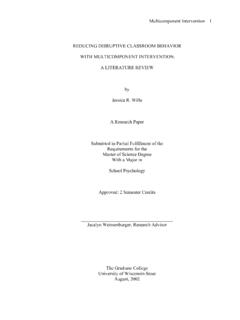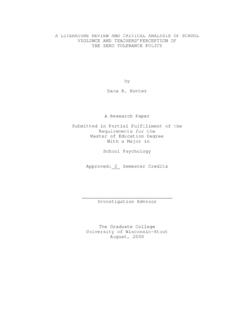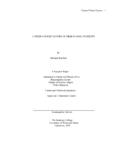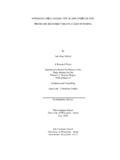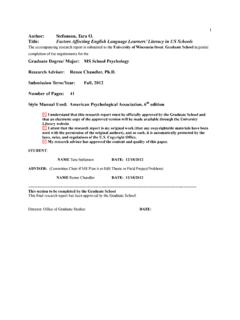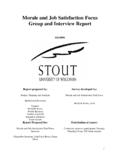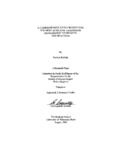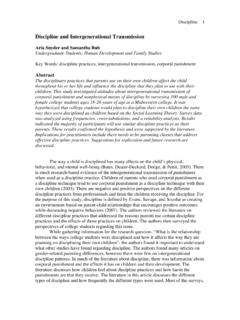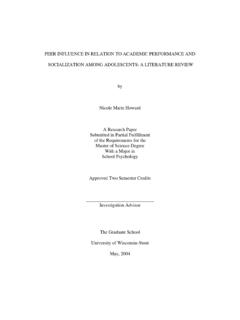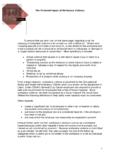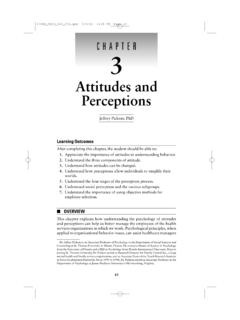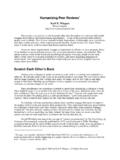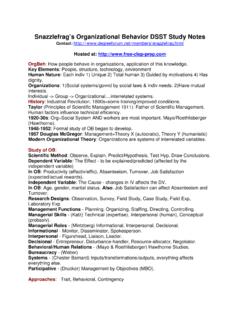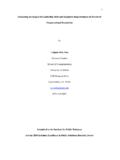Transcription of The Impact of Divorce'on Children: by A Research …
1 The Impact of Divorce'on children : What School Counselors Need to Know by Nicole Landucci A Research Paper Submitted in Partial Fulfillment of the Requirements for the Master of Science Degree III Guidance and Counseling Approved: 2 Semester Credits The Graduate School University of Wisconsin-Stout December, 2008 Author: Title: The Graduate School University of Wisconsin-Stout Menomonie, WI Landucci, Nicole M. The Impact of divorce on children : What School Counselors Need to Know Graduate Degree/ Major: MS Guidance and Counseling Research Adviser: Carol Johnson, MonthNear: December, 2008 Number of Pages: 30 Style Manual Used: American Psychological Association, sth edition ABSTRACT Parents going through divorce may have children who experience increased likelihood for problems with social skills, behavior issues, and academic achievement. ii Parents who share similar views and practices for role expectations, discipline, and time spent with children may diminish the negative Impact divorce often has on children .
2 Divorced parents who live separately but focus on ways to create stability in the home, help smooth transitions between homes, and offer good communication help the social and emotional development of their children . divorce may Impact the academic success of some students. It is important for school counselors to have an awareness of the warning signs that a student is struggling with home-life issues that carryover into the classroom. Strategies that school counselors may use to minimize the Impact of a troubling divorce include support groups, individual counseling, referral to community agencies, and effectively including and communicating with both sets of parents. iii The Graduate School University of Wisconsin Stout Menomonie, WI Acknowledgments iv I would like to express my appreciation to my thesis advisor, Dr. Carol Johnson for her support, guidance, and helpful suggestions throughout this Research work. I also wish to thank my family and friends for encouraging me to pursue this degree and for helping me reach my goal of completing my Master's degree.
3 TABLE OF CONTENTS .. Page Abstract .. ii Chapter I: Introduction .. 1 Statement of the Problem .. 7 Purpose of the Study .. 7 Limitations and Assumptions of the Study .. 8 Research Questions .. 8 Definition of Terms .. 9 Chapter II: Literature Review .. 10 children 's Feelings and Behavior ..1 0 Ages of children and Response to divorce .. 11 Parent and Child Bond .. 13 Challenges of Loss of Income .. 15 Perceptions of children with Single Parents .. 16 Parental Influences .. 17 Strategies to Help children of divorce .. 17 Coping Skills .. 18 Chapter III: Summary and Recommendations .. 20 Summary .. 20 Recommendations for School Counselors .. 21 Recommendations for Further Research .. 22 References .. 23 Chapter I: Introduction "To be separated from his mother is to lose a part of himself, as to be separated from a hand or foot" (Bums cited in Owusu-Bempah, 2007, ). divorce is a recurrent event in the United States that has impacted more than one-third of America's children ( Bureau of Census cited in Owusu-Bempah, 2007).
4 For many children , the effects of divorce can have instantaneous and long-lasting results. 1 According to Robert Hughes (2008), there are two factors influencing the rising divorce rates in the United States. The first factor is both men and women are relying less on one another for economic survival. As women gain status in the workplace, they often qualify for their own medical and retirement benefits enabling them to be less dependent on the male head of household. Women who are gainfully employed and self-sufficient may be more willing to dissolve a marriage because they are not perceived as a financially dependent spouse. Financial stability allows for the female head of household to have more flexibility to exit a broken marriage. Secondly, the "childless-by-choice" Impact of birth control allows couples to divorce without worry for the emotional stress on a child. Couples without children may have less desire to stay in a failing marriage for the sake of the children if there are no children .
5 It is important to remember that as divorce rates continue to increase so does the likelihood that children of divorced parents may have a greater risk adjusting in areas of social relationships, educational achievement, psychological adjustment, self-concept, behavior/conduct, and social relations, according to Amanto and Keith (cited in VanderValk et aI., 2005). There have been numerous studies (Dykeman, 2003; Jeynes, 2001; Wallerstein, 2005), that have documented the Impact divorce may have on children . Sun (cited in ValderValk et aI., 2005) found children of divorced parents may have a lower sense of psychological well-being than children who grew up with intact families. Research also confirms that children of divorced parents may experience emotional problems such as loneliness and depression (Asetline & VanderValkcited in VanderValk et aI., 2005). children may also feel the Impact of divorce as it carries over into the classroom.
6 "Studies comparing the school records of children from one-parent and two-parent families have found that children raised in one-parent homes have an increased risk of poor academic achievement" (Burns & Brassard cited in Hargreaves, 1991, p. 40). 2 Whitemarsh (2008) found that educators are often the first to notice a change in behavior when a family is in transition. Teachers have observed that some children from divorced families may show decreased functioning in academic performance and display oppositional behavior, or signs of anxiety and depression. Whitemarsh (2008) further noted diminishing ability to concentrate in class, declining attendance and willingness to participate in class may indicate a child is having a difficult time adjusting to a transition in family dynamics. According to Hargreaves (1991), children 's resilience in a one-parent household is believed to be a significant indication of success in other areas of their lives, including academics.
7 Similar to a domino effect, children under emotional heartache and stress at home often have emotions that interfere with concentration during the school day. Poor school performance often agitates the parent and the dominos continue to fall as the child loses self-confidence and experiences decreased performance in school. children may have a difficult time concentrating on school work from divorce -related stress occurring at home. children may face unique challenges of completing homework assignments when organizing their homework, backpack, and paperwork between multiple homes. 3 According to Smith (1999), some children are flexible and adapt well to change largely due to implementing effective coping strategies, while other children may react in the opposite way. children may lose confidence, blame themselves for the break-up, and see their parent's separation or divorce in a complicated way. The range of feelings that a child may encounter include: disbelief and denial, sadness, loss, loneliness, depression, anger, anxiety, fear, relief, and hope.
8 Response to these feelings often results in different levels of intensity (Smith, 1999). While some children may experience mild anxiety and sadness, others may feel more intense emotions. Smith (1999) also found that children 's reaction to their parent's divorce varies based on the child's age. Older children may have more resilience than others due to their support systems, maturity level, and coping skills. There are certain expectations in response to divorce depending on the child's age. Younger children may have a more difficult time. According to Robert Hughes (2008), limited details are known about the Impact of divorce on children younger than two-years-of-age; however, there may be negative effects on toddlers if the relationship with their parent is greatly disrupted. Younger children may cry more than usual or may become clingy. If both parents stay dynamically involved in parenting, they can continue to build a healthy relationship with the child, and may reduce the amount of stress in the home.
9 children may become more agitated and clingy to one parent when the other parent is absent from the home. When the child encounters the absent parent the child then may be more attached to that parent out of fear of his or her absence from the family (Hughes, 2008). Three-to five-year old children of divorced parents have the tendency to be anxious and may resort to immature or aggressive behavior. children may return to comforting blankets or familiar favorite toys. children also may struggle with toilet training at this time. These behaviors can last for a lengthy period of time because children may be confused about the different living arrangements when shifted from one home to another (Hughes, 2008). 4 During the preschooler stage, children may become less cooperative in their play. Preschoolers who are experiencing separation or divorce in the family may spend more time playing by themselves than interacting with others.
10 In social situations children may spend more time seeking attention and being close to adults. With time, most children begin to comprehend and adjust to their parent's divorce (Hughes, 2008). School-age children from six-to eight-years of age may have a perception of what a divorce is, and are capable of coping with the transition. children may grieve over the change in their family and may yearn for the absent parent. children who are nine-to twelve-years old somewhat understand the divorce and are generally able to keep both their feelings and behavior manageable. For this age group, anger is often the most powerful emotion. children may physically act out their emotions and imitate family dynamics during play in order to cope with their feelings (Hughes, 2008). By adolescence both boys and girls are likely to comprehend divorce more than younger children because of their maturity level. Hughes (2008) suggested adolescents 5 may feel they are competing with their parents when they see adults going on dates and becoming passionately involved.
